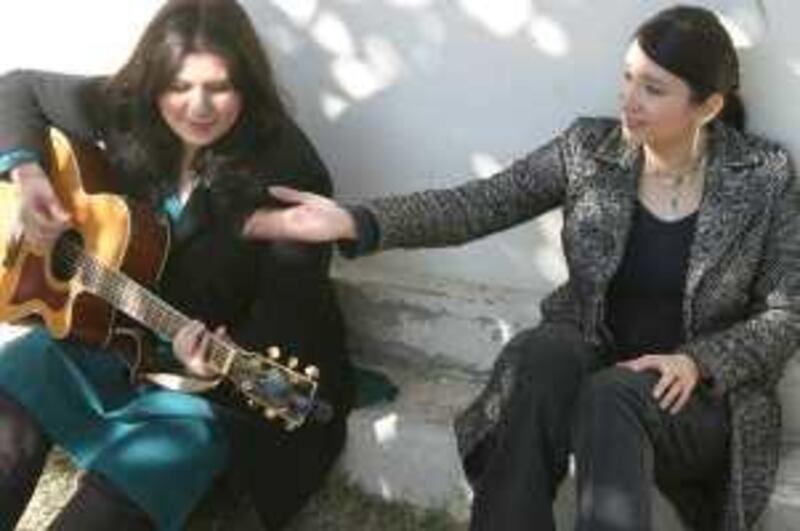PESHAWAR // When a bomb ripped through a group of CD shops in a central Peshawar market in Oct 2007, it reduced 10 stores almost to rubble and damaged another 30. It was one of many similar attacks that year designed to quash the public's desire for music and movies, but for two cousins it only added to their drive to make their voices heard. Haniya Aslam and Zebunisa Bangash are both 29 years old and make up Zeb and Haniya, a pop music duo which has the distinction of being the country's first and only all-female band.
Last year, their first album, Chup! (Hush), hit stores amid widespread critical acclaim in almost every major publication in the country. For Aslam, incidents like the bombing in her hometown of Kohat serve to reinforce her ambition of pursuing her musical goals. "We just have to make sure we can establish a culture, a society and a political system conducive to the arts so we may foster our artists and prove to the world that Pakistan is not only about militants, violence and outmoded traditions," she said.
But playing music has become akin to playing with fire, especially in the violence-ridden North West Frontier Province in Pakistan. In recent months extremist factions have continued to bomb CD shops and intimidate musicians, forcing some of them to abandon the province or even the country. Public performances have become a thing of the past in Peshawar, where those who sell or play even seemingly innocuous music fear for their lives.
"The cultural life of the city has come to a halt," said Hassan Askari, a political analyst. "The fundamentalists are stifling music, art, paintings; everything. Freedom of expression is being challenged at its very core." Though Zeb and Haniya come from NWFP, they have escaped the wrath of the Taliban, largely because they do not play in public there. The response to their live performances in urban centres like Lahore, Karachi and Islamabad has been promising, but invitations for public gatherings are dwindling and a live show in Peshawar seems impossible, at least in the near future.
Peshawar was once a centre of music. In the 1990s the rule of the Taliban in Afghanistan pushed scores of artists into Pakistan, the capital of NWFP becoming their natural home. A Pashtun pop culture began developing in the city as entertainers, film producers and musicians all began escaping to Pakistan. Gradually a film industry which served up a diet of violent and sexy movies to eager Pashtun audiences began emerging, and music became a part of every day life.
"It was a very vibrant place," said Hassan Rashid, a tabla player, who moved from Peshawar to Lahore about two years ago. "Music was part of our lives, and every occasion, be it a birthday party, a wedding or just a family dinner included music." But today's Peshawar is a different story. For the duo, the most rewarding aspect of performing is the response they elicit from young Pashtuns who regularly approach them and thank them for promoting the culture of NWFP.
Chup! featured the duo's brand of folksy music which draws on their Pashtun heritage and is reminiscent of Sufi traditions from NWFP. Bangash describes their music as a culmination of the various sounds and tastes they have experienced. "The truth is everything we have ever heard or appreciated can be felt through our music," she said. "We listen to a wide range of musical influences, be they Eastern classical music, Bollywood, folk or 60s music."
Bangash, who has been taking singing lessons since she was eight, is the lead vocalist for the band, while Aslam writes most of the lyrics and sometimes sings. Though always close as cousins, the two first began collaborating on music around 2000 while they were in the United States pursuing undergraduate degrees - also something unusual for Pashtun women. On a whim they uploaded their music to the internet to share with friends back home, and were taken aback when a year later they flew back to Pakistan and found their songs had become radio hits. The unexpected success gave them the courage to pursue the dream of making an album and Pakistan's best music producer agreed to take them on.
Pakistan's leading music critic, Nadeem Farooq Paracha, praised the duo for "breaking new ground being an all-female band". But a major reason why Zeb and Haniya have made headlines all over the country is their heritage. The paradox of Pashtun women performing onstage all over Pakistan at a time when musicians and entertainers in Peshawar are being persecuted strikes some as risky while for others it is a glimmer of hope that the province and the country will rebound to its previous vibrant self.
"These two girls represent the other side," said Amjad Islam, a senior journalist with the Nawa-e-Waqt daily newspaper. "They show us how all is not bleak in Pakistan and how music and song and all that is beautiful in our culture is continuing to live on." Aamir Mazhar, an event manager, agrees. "Performers, especially female performers, are becoming almost extinct in Pakistan," he said. "Musicians such as Zeb and Haniya inspire the youth and are a sign of better times to come. Young girls look at them and think, if they can do it, so can we. Through such daring young women, our culture will continue to prosper."
* The National






